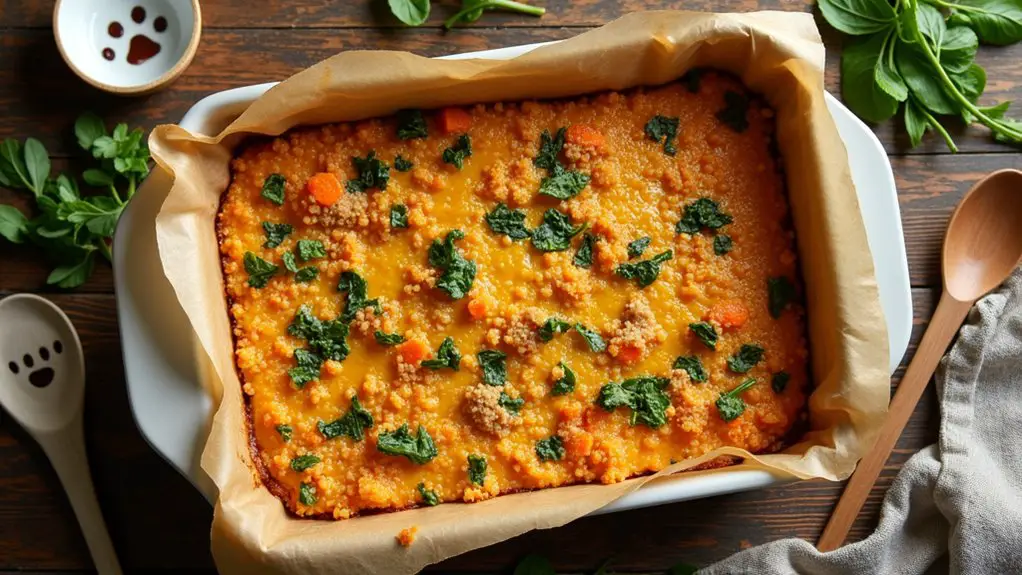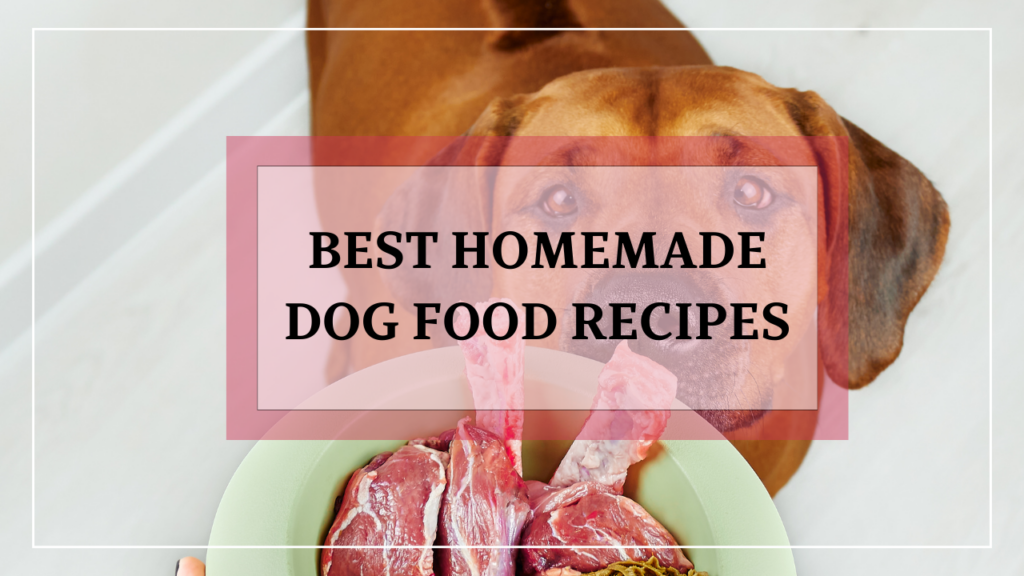When it comes to whipping up the best homemade dog food for your senior pup, it can feel a bit overwhelming, right? You want to guarantee your furry friend gets all the nutrients they need. Luckily, making their meals at home lets you ditch those mystery ingredients found in store-bought options. Plus, it’s not as complicated as it seems. So, what’s cooking today? Let’s explore some tasty recipes that’ll make tail wags a promise.
Why Homemade?
When it comes to feeding your senior dog, you might wonder, “Why should I bother with homemade food?”
Well, let’s face it—store-bought options can often feel like a mystery wrapped in a shiny bag. You can’t always be sure what’s packed inside that kibble or canned stuff. By making homemade dog food for senior dogs, you have control. You know exactly what ingredients go in, and you can tailor meals to your pup’s specific needs.
Store-bought dog food can feel like a mystery. With homemade meals, you control the ingredients and cater to your pup’s unique needs.
Imagine whipping up a comforting chicken and vegetable mix that’s perfect for their age and health.
Plus, let’s be real—your dog can sniff out fresh food way better than the stuff from the store. And who wouldn’t want a happy tail wagging in approval?
It’s rewarding, bonding time. So why not trade mystery meals for heartfelt homemade goodness? Your senior buddy will thank you with every wag!
Meal Ideas for Seniors
When it comes to meal ideas for your senior dog, there are plenty of tasty options that’ll keep their tails wagging.
Think about whipping up a Chicken and Sweet Potato Meal or a Beef and Barley Blend; both are super simple and packed with nutrients.
If your pup’s more of a seafood fan, they’ll love the Fish and Rice Delight, while a Turkey and Quinoa Medley makes a great twist for variety—trust me, your kitchen might smell better than the dog treats you’ve been munching on!
1. Chicken and Sweet Potato Meal

When it comes to making a special meal for your senior dog, chicken and sweet potatoes are a winning combo. You’ll want to gather some easy ingredients, and I promise it won’t take long to whip up. Let’s chat about how to prepare this tasty dish, plus some optional add-ons to really make it pop.
Ingredients
If you’re looking to whip up a tasty meal for your senior dog, this chicken and sweet potato dish is a wonderful choice. It’s not just scrumptious, but super healthy, too. Plus, sweet potatoes are packed with fiber that helps keep them regular.
And let’s be honest, who doesn’t love a good sweet potato? Just be sure to follow the ingredient list so your furry friend gets all the nutrients they need to stay spry and happy.
- 2 cups cooked, shredded chicken (preferably boneless and skinless)
- 1 cup sweet potatoes, peeled and diced
- 1/2 cup green beans, chopped (fresh or frozen is fine)
- 1/4 cup carrots, diced
- 1 tablespoon olive oil (for a little added shine)
- 1/4 teaspoon turmeric (helps with joint health)
- A pinch of salt (optional, but make sure it’s very little)
Gathering these ingredients should be a walk in the park—or at least a quick trip to the grocery store.
Just imagine the joy on your pup’s face when they smell this cooking. Trust me, it’s worth every minute spent in the kitchen.
Now, let’s get cooking and serve something that’ll have those tails wagging.
Step by Step Instructions
- Preheat your oven to 400°F (200°C) to get it nice and warm for later.
- Peel and chop 2 medium sweet potatoes into small cubes. Aim for about 1-inch pieces for even cooking.
- In a large pot, bring water to a boil (about 4 cups should do). Add the sweet potato cubes and cook for 15-20 minutes, or until they’re tender when you poke them with a fork.
- While the sweet potatoes are boiling, take 1 pound of boneless, skinless chicken breasts and place them in a saucepan. Cover with water and bring it to a gentle boil.
- Once the water is bubbling, reduce the heat and simmer the chicken for 12-15 minutes, or until it’s cooked through.
- You’re looking for no pink in the center. (Don’t worry—you can’t mess this up, just keep an eye on it!).
- After the chicken is done, remove it from the pot and let it cool for a few minutes before shredding it into bite-sized pieces using two forks.
- Drain the sweet potatoes, then mash them in the pot with a potato masher or fork until smooth-ish.
- It’s okay if there are some small chunks, your dog will love the texture.
- In a large mixing bowl, combine the shredded chicken and mashed sweet potatoes. Mix well until everything is combined.
- (You can do a little happy dance while mixing if you want—your dog might enjoy the show).
- If your dog allows it, stir in 1/2 cup of green peas.
- They add a bright pop of color and nutrients, making the meal even more exciting.
- Spoon the mixture into an airtight container or individual serving-size containers to make meal time easy.
- Cool completely before serving to your dog. They’ll be wagging their tail in anticipation!
Optional Add-ons
Now that you’ve whipped up a delicious chicken and sweet potato mix for your senior pup, you might be wondering how to jazz it up a bit.
Consider adding a touch of olive oil for healthy fats or sprinkle some chopped parsley for fresh breath.
Cheese lovers? A sprinkle of grated cheese can turn mealtime into magic. Your pup won’t know what hit them; they’ll love it!
2. Beef and Barley Blend
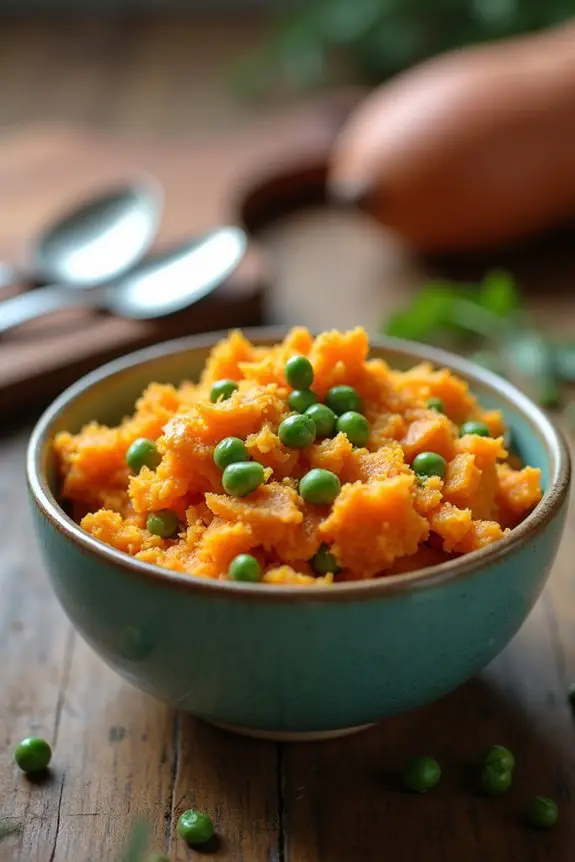
Ready to whip up something special for your senior dog? The Beef and Barley Blend isn’t only tasty, but it’s also packed with nutrients that they need as they age. Let’s break down the ingredients, follow some easy step-by-step instructions, and explore a few optional add-ons that’ll make your pup wag their tail with joy.
Ingredients
When it comes to whipping up a hearty meal for our senior pups, we want something that not only nourishes but also delights their taste buds. So, if you’re looking for a cozy mix of beef and barley that’s easy on their tummies, you’ve come to the right place.
Here’s what you’ll need for this simple yet satisfying Beef and Barley Blend.
- 1 pound ground beef (lean is best for those aging joints)
- 1 cup barley (check if it’s hulled for better digestion)
- 3 cups water (it helps cook everything up just right)
- 1 cup chopped carrots (for that extra crunch and vitamins)
- 1/2 cup peas (frozen or fresh works—let’s keep it simple)
- 1 tablespoon olive oil (good for shiny coats and happy hearts)
It’s that straightforward. Just think about the wagging tails when they gobble this up.
Honestly, trying to get my dog into the kitchen for a taste test is a little like herding cats, but she always knows when something yummy is cooking.
Just imagine her drooling as the aroma fills the air; it makes my own dinner pyramids pale in comparison.
Step by Step Instructions
- Begin by gathering all your ingredients: ground beef, barley, carrots, peas, and spinach. It’s essential to have everything ready before you start cooking.
- In a large pot, add 4 cups of water and bring it to a boil. This will be used for cooking the barley.
- Once your water is boiling, stir in 1 cup of barley. Reduce the heat to low, cover it, and let it simmer for about 30 minutes, or until the barley is tender. You can peek occasionally to check the progress—just resist the urge to stir it too much.
- While the barley cooks, heat a large skillet over medium-high heat. Add 1 pound of ground beef to the skillet. Cook it until it’s browned, breaking it apart as you go (should take about 5–7 minutes). You want no pink bits—just nice, crumbled beef.
- Once the beef is cooked, drain excess fat. You’re aiming for tasty, not greasy, so let some of that fat go.
- Add 1 cup of diced carrots and 1 cup of peas to the skillet. Sauté them with the beef for about 5 minutes, until the carrots are tender and vibrant—nobody wants sad-looking veggies.
- Toss in 1 cup of chopped spinach and mix well, letting it wilt for a minute or two. The vivid green of the spinach adds a pop of color and nutrition to your blend.
- Once the barley is tender, drain any remaining water, and fold it into the beef and veggie mixture. Be gentle here; you don’t want to mash anything—just enough mixing to unite all the flavors.
- Let your delicious beef and barley blend cool off completely before serving it to your dog. It’s tempting to share right away, but trust me, no one wants a scalded canine buddy.
- Pour into your dog’s bowl and watch the tail wag. Enjoy the happy dog moments, knowing you’ve contributed to their health and happiness.
Optional Add-ons
If you’re looking to spice up your senior dog’s beef and barley blend, there are some tasty optional add-ons that can elevate their meals without overwhelming their delicate stomachs.
Think about tossing in some cooked carrots, peas, or even sweet potato. These not only add flavor but give extra nutrients.
Your dog’s tail might just wag a little more with each bite.
3. Fish and Rice Delight
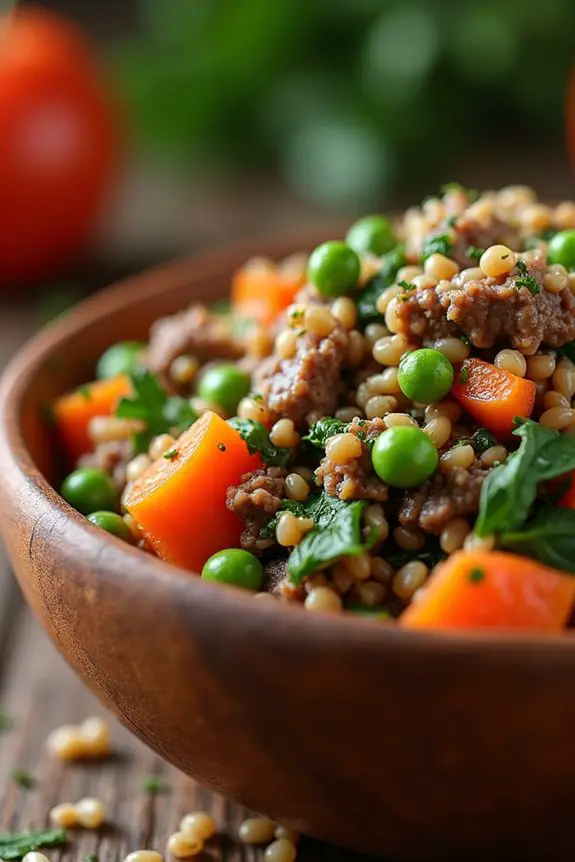
Ready to whip up something tasty for your senior pup? Fish and rice might just be the perfect combo, packed with nutrients and flavor. Let’s gather our ingredients, step through the cooking process, and maybe even sprinkle in some optional add-ons to keep mealtime exciting. Remember, incorporating premium dog food brands can elevate your dog’s nutrition and provide additional dietary benefits. Additionally, regular premium dog ear care is essential for maintaining your dog’s overall health and well-being.
Ingredients
When it comes to making tasty meals for our senior pups, you can’t go wrong with something like Fish and Rice Delight. It’s packed with nutrients that will make their tails wag while being gentle on their tummies. Plus, it’s super easy to whip up, and you likely have most of these ingredients at home already. Let’s dive straight into what you need!
- 1 cup of cooked white rice (plain, no seasoning)
- 1 cup of boneless, skinless salmon (cooked and flaked, you can use canned salmon too, just be sure it’s packed in water)
- 1/2 cup of sweet potato (cooked and mashed, yum)
- 1/2 cup of green peas (fresh or frozen works great)
- 1 tablespoon of fish oil (for healthy omega-3 fatty acids)
- 1/4 cup of chopped fresh parsley (optional, but hey, it’s a nice touch)
Step by Step Instructions
3. Bring 2 cups of water to a boil in a medium saucepan.
4. Once the water is boiling, add the rinsed brown rice. Stir gently, then reduce heat to low, cover, and let it simmer for about 35-40 minutes, or until the rice is tender and the water is absorbed.
5. While the rice cooks, drain the tuna can and set it aside. (Don’t forget—the tuna is the star of the show here!)
6. In a separate pan, heat a splash of olive oil over medium heat. Toss in the chopped spinach and peas. Sauté for about 3-5 minutes, or until the spinach wilts and the peas are bright green.
7. Once the rice is done, fluff it up with a fork and then mix it into the pan with the sautéed vegetables.
(It’s like inviting the rice to a party with the veggies—everyone loves a good mix!)
8. Finally, fold in the drained tuna gently. Make sure everything is well combined but don’t overmix—it should just look like a happy reunion of all ingredients.
9. Let the mixture cool for a couple of minutes before serving it to your dog, as it might be a bit steamy.
Cool completely before serving to your dog.
Optional Add-ons
Mixing fun and nutrition doesn’t have to be complicated, especially for our beloved senior pups.
Try a simple fish and rice delight. Just steam some white rice, add cooked, flaked salmon or white fish, and toss in a handful of steamed veggies.
It’s quick, tasty, and packed with goodness. Your older dog will think they’re dining at a fancy restaurant, trust me.
4. Turkey and Quinoa Medley
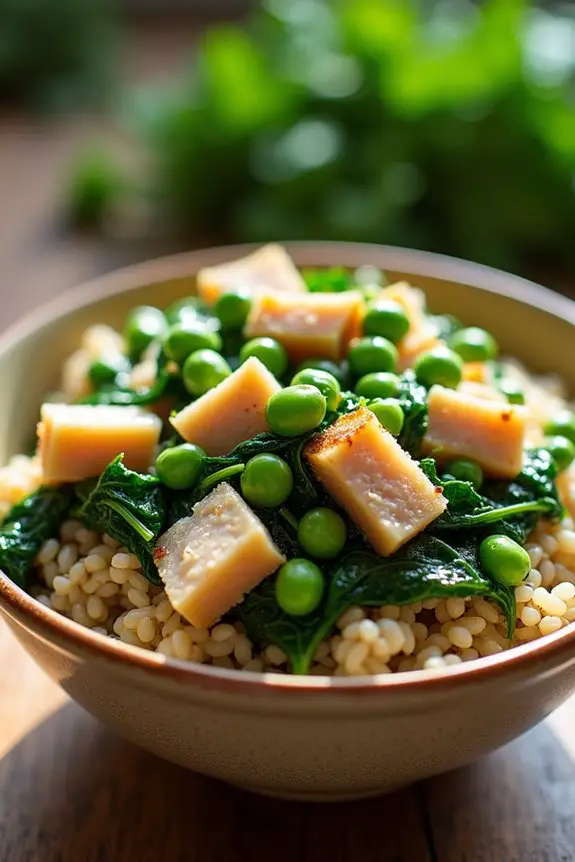
Ready to whip up a tasty Turkey and Quinoa Medley for your senior pup?
You’ll love how easy it’s to gather the ingredients and follow some simple steps to create a nutritious meal. Choosing the right professional dog training collars can enhance your pet’s learning experience for obedience training.
Plus, we’ll chat about optional add-ons that can make it even more special—because who doesn’t want to spoil their furry friend a bit?
Incorporating premium digestive supplements into your dog’s diet can also support their overall health and well-being as they age.
Ingredients
When it comes to our senior dogs, special care in their diet is essential. They’re like little old humans, right? It’s all about keeping them healthy while providing tasty bites they’ll savor.
So, let’s roll up our sleeves and whip up something delicious for your furry friend. The Turkey and Quinoa Medley is a super simple recipe packed with nutrients. Here’s what you’ll need:
- 1 cup ground turkey (make sure it’s lean, we want to keep them spry)
- ½ cup quinoa (this little grain is full of protein, all the good stuff)
- 1 cup diced carrots (because who doesn’t love a pop of color and crunch?)
- ½ cup frozen peas (easy peasy, just toss ’em in)
- 2 tablespoons olive oil (a bit of healthy fat to keep their coat shiny)
- 2 cups water (to help the quinoa cook perfectly)
- 1 teaspoon dried rosemary (for flavor, and it’s good for their tummy too)
Sourcing these items shouldn’t feel like a scavenger hunt; you’ll find them at your local grocery store. Easy peasy, right?
Your senior dog will definitely appreciate the effort you put into this delicious meal. And who knows, you might just find your cooking skills improving too!
Step by Step Instructions
- Start by rinsing 1 cup of quinoa under cold water in a fine-mesh strainer (this helps remove any bitterness).
- In a medium saucepan, combine the rinsed quinoa and 2 cups of low-sodium chicken broth or water. Bring to a boil over medium heat.
- Once boiling, reduce the heat to low, cover, and simmer for about 15–20 minutes, or until the quinoa is fluffy and all the liquid is absorbed (you’ll know it’s ready when it looks like a tiny little spiral).
- While the quinoa cooks, heat a large skillet over medium heat. Add 1 pound of ground turkey and cook until browned, about 5–7 minutes (make sure there’s no pink left).
- Add 1 cup of chopped carrots and 1 cup of chopped green beans to the skillet. Stir for 5–7 minutes until the veggies are tender (they should have a nice, bright color).
- Once the quinoa is ready, add it to the skillet with the turkey and veggies. Mix everything together until combined—think of it as a little turkey and veggie party.
- Season the mixture with a pinch of dried parsley for flavor, just be careful not to add too much salt (your pup’s heart will thank you).
- Let the medley cool down for a bit before serving.
- Cool completely before serving to your dog.
Optional Add-ons
While the turkey and quinoa medley is already a tasty treat for your senior pup, think of it as a canvas waiting for some creative strokes of flavor and nutrition.
Toss in some steamed carrots or a sprinkle of spinach for extra vitamins.
Maybe even a dollop of plain yogurt; it’s like a gourmet meal for your furry friend.
Who doesn’t love a little extra love in their bowl?
5. Vegetable and Lentil Stew
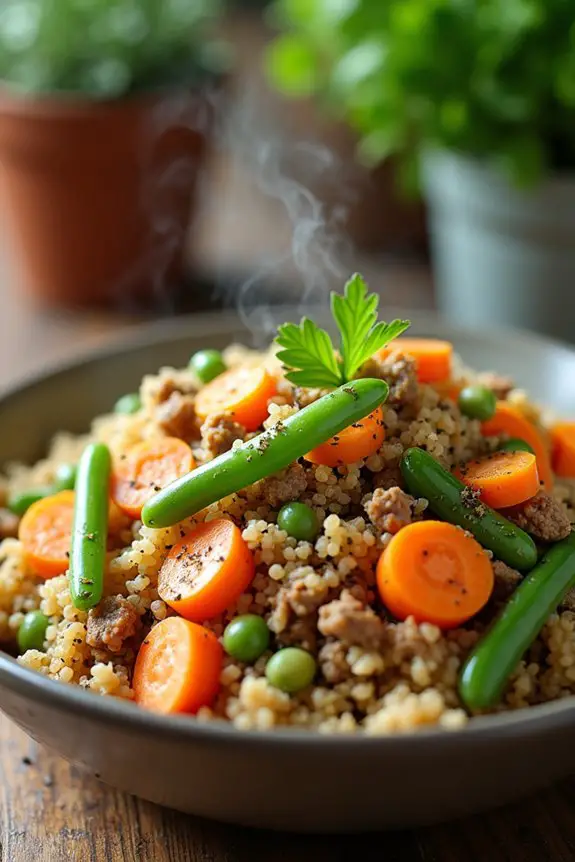
When you’re looking to whip up something nourishing for your senior pup, a vegetable and lentil stew is a fantastic option. It’s packed with wholesome ingredients that are easy on their tummy, and it’s straightforward to prepare—seriously, you won’t need a culinary degree. Let’s chat about the ingredients, step-by-step instructions, and some fun optional add-ons that can take your dog’s meal from basic to totally drool-worthy. Additionally, incorporating premium dog food can provide essential nutrients that support overall health.
Ingredients
When it comes to cooking for our senior pups, keeping things nutritious yet simple is key. One fantastic option is a hearty vegetable and lentil stew. It’s wholesome, easy to prepare, and let me tell you, your furry friend will be wagging their tail in approval.
And let’s face it, who doesn’t love to spoil their pet with a delicious homemade meal? So, let’s gather some good-for-your-doggo ingredients.
- 1 cup of green or brown lentils, rinsed
- 2 cups of chopped carrots
- 1 cup of chopped sweet potatoes
- 1 cup of green beans, chopped
- 4 cups of low-sodium vegetable broth
- 1 tablespoon of olive oil
- ½ teaspoon of dried thyme
With these simple ingredients, you’re all set to create a delightful stew that’s both tasty and nutritious for your senior dog.
Plus, the smell will have you wondering if you should be sharing a bowl too—just kidding! Save that one for the non-furry members of the family.
Step by Step Instructions
1. Gather all your ingredients: lentils, carrots, peas, sweet potatoes, vegetable broth, and spinach. Chop the carrots and sweet potatoes into small, bite-sized pieces.
2. Rinse the lentils under cool water to remove any debris or dust (it’s a small step, but trust me, they’ll appreciate it).
3. In a large pot, add four cups of vegetable broth and bring it to a boil over medium heat.
4. Once boiling, stir in the rinsed lentils and reduce the heat to a simmer. Cover the pot and let them cook for about 15–20 minutes, or until they’re tender but not mushy (nobody likes mushy lentils, right?).
5. While the lentils are simmering, add the chopped carrots and sweet potatoes to the pot. Stir them in gently and let everything cook together for another 10 minutes.
You’ll know they’re done when the veggies are tender—just poke them with a fork.
6. Now, toss in the peas and spinach, stirring until the spinach wilts—this should only take a couple of minutes.
7. If you want to add some seasoning, sprinkle in a pinch of turmeric for an extra health kick (but skip the salt; it’s not dog friendly).
8. Remove the pot from heat and let the stew cool for a bit. It’ll be even easier to manage once it’s not lava hot!
9. Spoon a portion into your dog’s bowl, and serve it alongside their regular food if they’re still adjusting to the homemade stuff.
Cool completely before serving to your dog.
Optional Add-ons
You’ve whipped up a delightful vegetable and lentil stew, but why stop there?
Consider tossing in some chopped spinach for extra iron, or a handful of sweet potatoes for a taste boost.
Maybe add a sprinkle of turmeric for anti-inflammatory benefits.
Your dog might just give you that “chef’s kiss” look, and who doesn’t love a little kitchen creativity?
Dig in and watch them enjoy!
6. Savory Lamb and Brown Rice

Get ready to whip up something delicious with savory lamb and brown rice, a perfect meal for your senior pup. You’ll want to gather some quality ingredients and follow a step-by-step guide that’ll make this dish easier than you think. And hey, if your dog loves variety, we’ll toss in some optional add-ons that’ll have their tail wagging in no time.
Ingredients
You want to whip up something special for your senior dog, right? This Savory Lamb and Brown Rice dish isn’t just packed with flavors; it’s also super nutritious, perfect for your furry friend who might need a little extra TLC. Let’s jump right into what you’ll need to get started on this yummy meal!
- 1 cup brown rice
- 1 pound ground lamb
- 1 cup carrots, diced
- 1 cup peas (fresh or frozen)
- 1/2 cup spinach, chopped
- 1 tablespoon olive oil
Step by Step Instructions
1. Start by gathering all your ingredients: 1 cup of brown rice, 1 pound of ground lamb, 1 carrot (finely chopped), 1 zucchini (finely chopped), and 1 cup of spinach (chopped).
2. Rinse the brown rice under cold water in a fine mesh strainer, this helps remove excess starch (and maybe some of your worries about cooking).
3. In a medium saucepan, add 2 cups of water and the rinsed brown rice. Bring it to a boil, then reduce heat to low, cover it, and let it simmer for about 45 minutes or until the rice is tender.
4. While the rice is cooking, grab a large skillet, and heat over medium heat. Add the ground lamb, breaking it apart with a spatula. Cook until it’s browned, which takes about 5–7 minutes.
5. Next, add the finely chopped carrot and zucchini to the skillet. Stir everything together and cook until the veggies are soft, about 3–4 minutes.
You want them just tender, not mushy, so keep an eye on them.
6. Once the veggies are ready, fold in the chopped spinach. Cook for another 2–3 minutes, just until the spinach wilts.
7. When the brown rice is done cooking, fluff it with a fork and then combine it with the lamb and veggie mixture in the skillet. Stir well, ensuring everything is nicely mixed.
8. Remove from heat and let the mixture cool.
9. Serve a portion to your dog and enjoy watching them devour this hearty meal.
Cool completely before serving to your dog.
Optional Add-ons
When thinking about sprucing up your dog’s dinner, consider these optional add-ons that can turn your basic savory lamb and brown rice meal into a gourmet feast tailored for your senior pooch’s palate.
Try tossing in some steamed veggies like carrots or peas.
A sprinkle of parsley can freshen up breath, too.
Your pup deserves that little extra love, don’t you think?
7. Mackerel and Pumpkin Feast
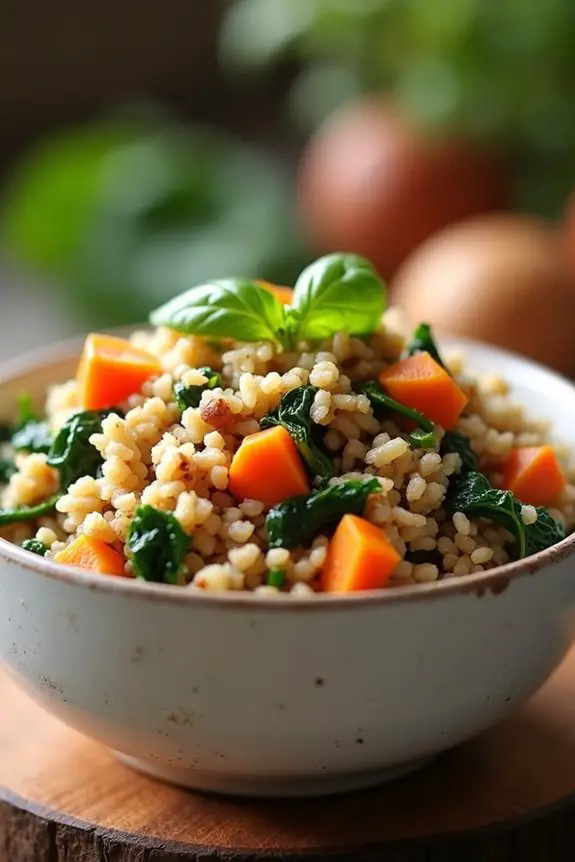
Ready to whip up a hearty Mackerel and Pumpkin Feast for your senior pup? You’ll want to gather a few key ingredients and follow some simple steps to make this delicious dish. And if you’re feeling a bit adventurous, I’ll toss in some optional add-ons to really make it shine.
Ingredients
When it comes to cooking for our furry companions, especially senior dogs, it’s important to focus on wholesome ingredients that provide the nutrients they need.
Think of this Mackerel and Pumpkin Feast as a doggy delight that’s simple, tasty, and oh-so-good for our aging pups. Plus, who doesn’t love a meal that you can whip up in no time?
Let’s explore the goodness you’ll need for this recipe.
- 1 cup mackerel, canned in water (drained and flaked)
- ½ cup pure pumpkin puree (not the spiced pie filling)
- ½ cup cooked rice (white or brown, whatever you have on hand)
- 2 tablespoons peas (fresh or frozen)
- 1 tablespoon flaxseed oil (for those shiny coats)
- 1 small carrot, finely grated
These ingredients are all safe and tasty for your senior pup. It’s important to use simple, fresh foods that support their health.
You want your dog to wag their tail, not worry about tummy troubles, right? Happy cooking!
Step by Step Instructions
- Preheat your oven to 350°F (175°C) to get things rolling. A warm oven means good things are coming—like dog happiness.
- Open a can of mackerel and drain it well. This might be a bit messy, but think of it as a scavenger hunt for tasty fish bits.
- In a mixing bowl, combine the drained mackerel, 1 cup of cooked quinoa, and 1 cup of pureed pumpkin. It’s like a cozy gathering of flavors—mix them together with a sturdy spoon.
- Add 1 beaten egg to the mixture, which helps bind everything together. Whisk it in until fully combined. Don’t rush; this is the heart of the meal.
- If you want to add fun extras, toss in 1/4 cup of chopped spinach or carrots for a nutrient boost. Scrape the sides of the bowl to make sure every bit is mixed in evenly.
- Line a baking dish with parchment paper. This makes cleaning up a breeze—thank me later.
- Pour the mixture into the dish and spread it evenly, like frosting on a cake. You want it to bake evenly.
- Bake in the preheated oven for 25–30 minutes, or until the edges are golden brown. The smell will make you wonder if you’ve accidentally entered a gourmet restaurant.
- Let the dish cool for about 10 minutes after you take it out of the oven. You don’t want to serve it too hot; your pup deserves better than a burnt tongue.
- Cool completely before serving to your dog. They might just perform tricks for this delicious reward.
Optional Add-ons
Looking to spice up your senior dog’s meal routine?
Try a delicious Mackerel and Pumpkin Feast.
Mix canned mackerel with plain pumpkin puree, add some cooked brown rice, and a sprinkle of parsley for extra flavor.
Your dog will love it.
Who knew being a gourmet chef was this easy?
It’s a simple upgrade that might just make their tail wag even more.
Monitoring Weight Regularly
How can you keep your senior dog healthy and happy? One way is by monitoring their weight regularly. You mightn’t realize it, but those extra pounds can sneak up like that side-eye from your pup when dinner is late.
Weigh your dog every month or so—just use a regular scale and do the math. If you’re struggling, try weighing yourself first, then hold your furry friend and see what that adds up to. Easy, right?
Weigh your dog monthly on a regular scale—just do the math or weigh yourself first, then add them together. Simple!
Keep track of changes, and if your dog starts gaining or losing too much weight, it’s time to tweak their homemade diet. Maybe they need a little less chicken or a tad more veggies. Don’t worry; adjusting is part of the game. You want them fit and feeling fabulous, so listen to what their body’s telling you.
Regular weight checks can be a game-changer for your senior dog’s overall health.
Frequently Asked Questions
Can I Use Leftovers to Make Dog Food?
Yes, you can use leftovers to make dog food. Just guarantee they’re safe for dogs, avoid harmful ingredients, and balance the nutrients. Mix in fresh veggies or grains to create a nutritious meal for your pet.
What Ingredients Should I Avoid for Senior Dogs?
You should avoid ingredients like onions, garlic, chocolate, grapes, and raisins, as they can be toxic to senior dogs. Always check for artificial additives and excessive fats, too, to guarantee their health and well-being.
How Often Should I Change My Dog’s Diet?
You should change your dog’s diet gradually every few months if needed. Monitor their health, energy, and weight. If they show any signs of distress, consult your vet before making significant changes to their food.
Is Homemade Dog Food Suitable for All Breeds?
Yes, homemade dog food can be suitable for all breeds. However, you should consider your dog’s specific dietary needs, including any allergies or health concerns, and consult your veterinarian to guarantee a balanced diet.
Can I Freeze Homemade Dog Food for Later Use?
Yes, you can freeze homemade dog food for later use. Just make certain it’s properly sealed in airtight containers or freezer bags. This way, you keep it fresh and maintain its nutritional value for your pup.

Hi, I’m Ali Tarek, the founder of Animalsman. I’ve always been passionate about pets, especially dogs and cats, and I created this website to share practical tips, easy recipes, and helpful care advice for fellow pet lovers. My goal is to make pet care simple, enjoyable, and accessible for everyone. When I’m not writing or curating content, you’ll usually find me spending time with my furry friends or learning new ways to keep them happy and healthy.

